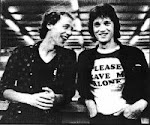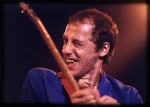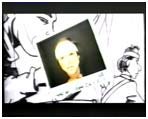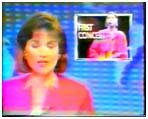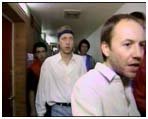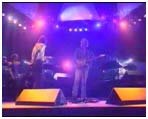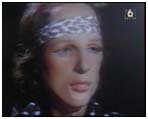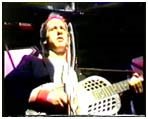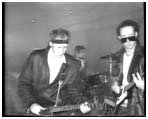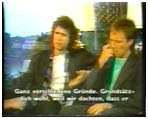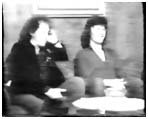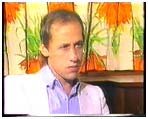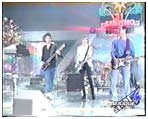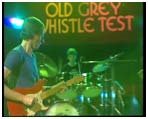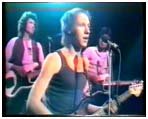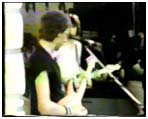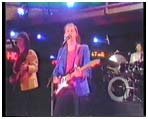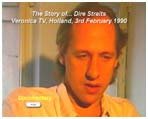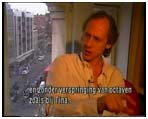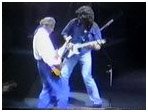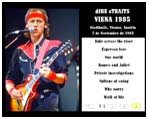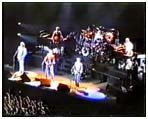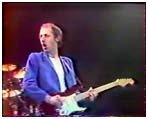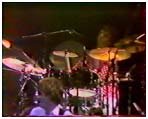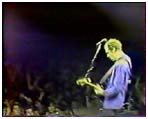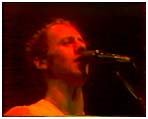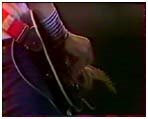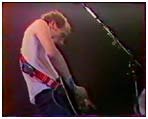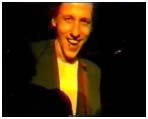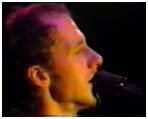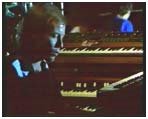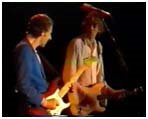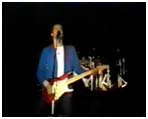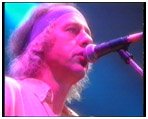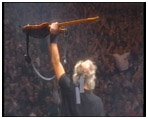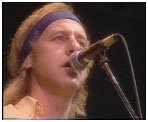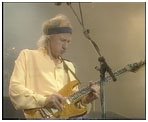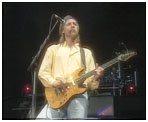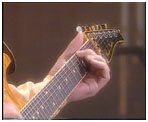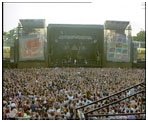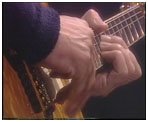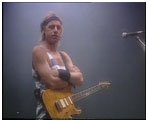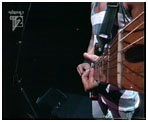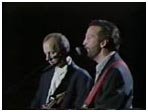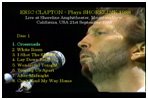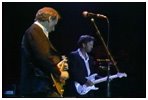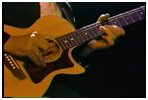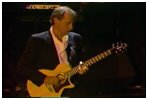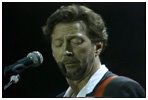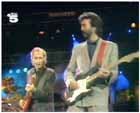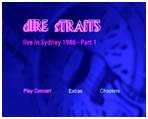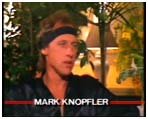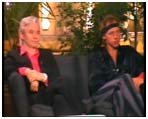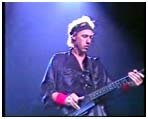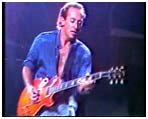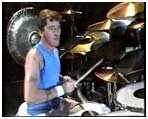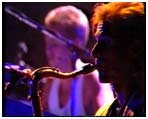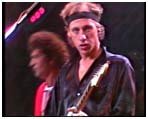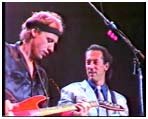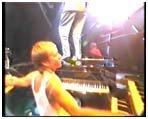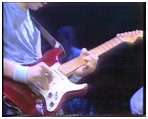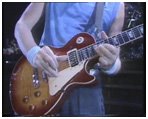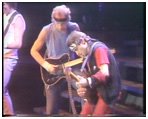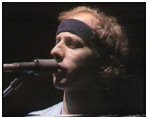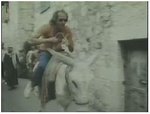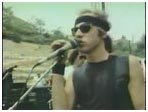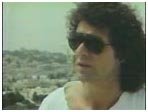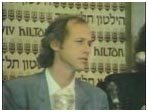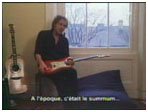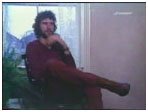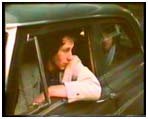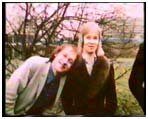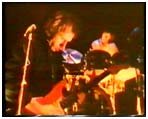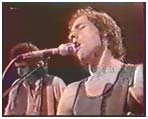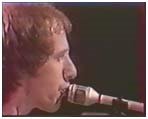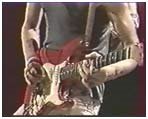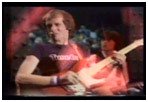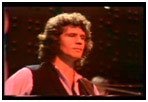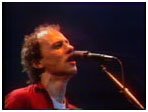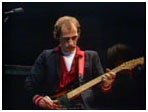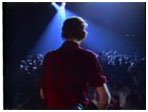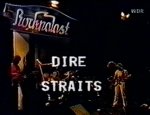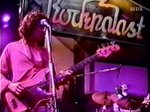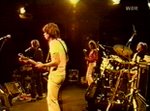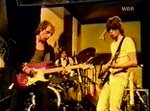quinta-feira, 27 de agosto de 2009
Anúncio- Get Lucky na TV
Para entrar ainda mais no clima desse maravilhoso Get Lucky! =)
Brunno Nunes.
sexta-feira, 14 de agosto de 2009
Entrevista do Mark sobre Get Lucky
Aqui está uma maravilhosa entrevista com Mark Knopfler sobre seu novo álbum ►Get Lucky, traduzida e cedida getilmente por minha amiga (Knopfleriana), Renata. =)
Renata, muitíssimo obrigado, gostaria de te parabenizar pela tradução, você "acendeu as luzes para nossa festa" =) quero dizer que só o fato dele ter lançado esse novo álbum e ter uma nova turnê já é uma festa e poder ler em nosso idioma uma entrevista maravilhosa como essa! ^^
O texto original da entrevista em inglês pode ser encontrado no site oficial► MK News no endereço
http://www.mark-knopfler-news.co.uk/GLpress.html
Mark fala sobre Get Lucky
Quando ficou combinado por alguma regra não escrita que artistas consagrados com uma trajetória de álbuns brilhantes ficam menos criativos ao continuarem a carreira, obviamente Mark Knopfler não estava prestando atenção. Ele estava muito ocupado compondo, gravando, fazendo turnês e curtindo tudo isso.
Assim, à medida que nos aproximamos do fim da primeira década do século XXI e outros artistas que venderam milhões de discos continuam a carreira em ritmo bem lento, Knopfler se prepara para lançar seu quinto álbum de estúdio da década e é outra jóia.
Get Lucky, gravado no premiado British Grove Studios no oeste de Londres e co-produzido com os amigos de longa data Chuck Ainlay e Guy Fletcher, é uma exploração belamente trabalhada das raízes musicais de toda uma vida.
Combinando blues e folk com letras originais, o todo contém ingredientes britânicos personalizados e um vívido lirismo observacional.
Aproveitando esse longo e intenso caminho de produtividade com gratidão o herói da guitarra, ganhador do Grammy e que tem uma reputação de mais de 30 anos, mostra seu habitual talento para se subestimar. “Eu apenas continuo aparecendo”, diz ele. “É exatamente isso. É exatamente assim que as coisas são e acho que a gente aprecia isso muito mais ao ficar mais velho. Eu costumava não dar valor a isso quando era novo. Não acho que respeitei o suficiente qualquer talento que eu tinha .— Tive que aprender isso. Então estou correndo atrás. É assim que as coisas acontecem. ”
“Posso me distrair com facilidade”, ele sorri. “É isso que os professores sempre falaram de mim. Mas mesmo assim eu ainda consigo escrever muito. Ainda sou um trapeiro de uma certa maneira. Pego essas coisas que se juntam, que estão juntas e estou gravando muito.Não falta material sobrando. Eu podia voltar para o estúdio agora se os rapazes estivessem aqui”.
Reinstalado no British Grove, o grupo habitual logo evocou uma atmosfera calma de talento artístico. “Entre nós, chegamos lá, faz parte da graça disso,” diz Mark. “Também acho que tem muito respeito mutuo.” Dessa vez, “os rapazes” ganharam o reforço dos admirados músicos Phil Cunningham e Michael McGoldrick , que se juntaram à mais recente inclusão na banda de Mark, o multi-instrumentista escocês John McCusker. “Eles já tocaram antes”, ri Knopfler admiravelmente.
Se fosse um romance, Get Lucky seria outro livro de Knopfler que você não consegue parar de ler com personagens que saem das letras como o motorista de caminhão de Glasgow da faixa que abre o álbum, “Border Reiver,” ou funcionário de parque de diversões ou apanhador de frutas da música–título ou a lembrança profunda de grandes navios em “So Far From The Clyde,” ou os tributos da vida real ao mestre na fabricação de guitarras em “Monteleone” e o tio falecido que Mark nunca conheceu em “Piper To The End.”
Esses e outros temas e personagens do álbum são vistos pelo prisma da infância de Mark em Glasgow até ele ter oito anos, quando a família se mudou para Newcastle. “Nós alguma vez saímos da infância?” reflete ele. “Algumas das coisas que nos atraiam quando éramos bem pequenos ficam conosco por toda a vida.”
Certamente isso é verdade no caso de Mark. “No fim da Salters Road em Newcastle, havia uma pequena loja de discos”, lembra ele. “Um dia tinha aquela Fender Stratocaster na vitrine e foi simplesmente mágico. Fiquei literalmente com o nariz na vitrine. Acho que ainda estava de calças curtas, e é isso, um menininho vindo da escola para casa, ficando completamente fascinado por ela.Agora eu ainda atravesso a estrada para olhar a loja de guitarras”.
O que nos mantém e o que provavelmente me faz seguir em frente é a emoção de tentar fazer algo , de simplesmente fazer algo. É isso. É óbvio que as coisas mudam um pouco mesmo, a gente cresce até certo ponto, mas tento manter esses pedacinhos de jovem em mim.”
A linha autobiográfica que perpassa Get Lucky é exemplificada pela faixa título. “O primeiro itinerante que já conheci cantava em bandas de soul no inverno e depois trabalhava em meio expediente em parques de diversão ou ‘ia para o sul colher frutas ’ quando o tempo esquentava,” explica Knopfler. “Eu tinha uns 15 anos, preso na escola e com inveja. ‘Get Lucky’ se originou a partir dele e de outros personagens viajantes que vim a conhecer em lugares em que me vi trabalhando por curtos períodos como fazendas, armazéns e obras antes de dar sorte com minhas músicas.”
”O título de “Border Reiver” vem dos invasores que corriam pelas fronteiras anglo escocesas séculos atrás. “Essa canção é sobre a dura vida de um caminhoneiro no fim dos anos 60 . Morávamos perto da fábrica da Albions em Glasgow e eu via os motoristas vestidos como grandes motociclistas com óculos de proteção e casações tirando os chassis para testá-los b antes que eles fossem encaixados nas cabines e plataformas de caminhão. A Albions era conhecida pela qualidade e ‘Certo como o nascer do sol’ era o lema da empresa.”
A canção também tem uma ligação temática com uma música do álbum de 1978 que ajudou a tornar Knopfler famoso. “ Em Newcastle morávamos perto da A1, a principal estrada ligando o norte e o sul do país,” diz ele, “e aos oito anos eu já estava começando a conhecer os uniformes das empresas de transporte à medida que os caminhões passavam pela cidade. Nos meus tempos de pegar carona na adolescência e aos vinte anos, muitos motoristas de caminhão bondosos paravam para me pegar. A música ‘Southbound Again’ do primeiro álbum do Dire Straits é sobre isso, sobre ir para o sul e o norte do país e meu romance florescente com Londres.”
Em um álbum no qual a vitalidade dos personagens se combina com o esplendor da instrumentação a música que o fecha é a tocante “Piper To The End,” escrita para o tio de Mark, Freddie. Ele era um gaiteiro do 1º Batalhão, Brigada Tyneside Scottish, o Black Watch, Royal Highland Regiment (Regimento Real Escocês) , que carregou a gaita para a batalha e foi morto com ela em Ficheux, perto de Arras em maio de 1940, com apenas 20 anos.
“Claro que não o conheci, mas eu e meu tio Kingsley, irmão de minha mãe, éramos muito íntimos. Primeiro ele me ensinou a boogie-woogie no piano e Freddie era o irmão mais velho de Kingsley. A gaita de fole sempre fez sentido para mim e como eu cresci em Glasgow e em Newcastle, havia os discos de Jimmy Shand, por isso o som da música celta sempre me pareceu familiar.”
Agora Knopfler e a banda aguardam ansiosos para cair na estrada de novo em 2010. “É como ser o capitão de um pequeno navio de guerra eu gosto dessa coisa de estar na estrada com o grupo, curto estar com a equipe. Suponho que uma das razões para eu gostar tanto disso é que saber que não vai durar um ano.”
”Em meio ao novo material, quando o público pedir músicas que fazem parte da vida de todos nós ,ele vai apreciar. “O lance das músicas antigas do Dire Straits é que elas são um marco na vida das pessoas. Obviamente, vou tocá-las de maneira diferente aqui e ali para mantê-las vivas e significativas para mim, sem essa coisa do honky tonky . Mas há casos como as partezinhas dedilhadas no fim de ‘Sultans,’ se não faço as partezinhas dedilhadas as pessoas acham que o mundo não está bem. Gosto de tocar as músicas antigas. Eu as escrevi as pessoas gostam de ouvi-las é simples assim.”
No fim , Mark Knopfler tem sucesso por nunca deixar de dar valor ao público . “Acho que ainda há lugar para o que eu toco,” reflete ele. Não é no mesmo tom que muitas outros estão tocando,o meu está em um lugar e o deles está em outro, mas as pessoas ainda querem ouvir canções trabalhadas.”
------► ◄-------
Mark talks about Get Lucky .....
When they agreed the unwritten law that time-honored artists with brilliant track records get less creative as they go on, Mark Knopfler obviously wasn’t paying attention. He was too busy writing, recording, touring and enjoying it all.
So as we approach the end of the first decade of the 21st century, and other multi-million-sellers nudge their careers forward at a snail’s pace, Knopfler prepares to release his fifth studio album of the decade, and it’s another jewel.
Get Lucky, recorded at his award-winning British Grove Studios in west London and co-produced with longtime cohorts Chuck Ainlay and Guy Fletcher, is a beautifully crafted exploration of a lifetime of musical roots.
Fluently combining folk and blues with his original songwriting, the whole containing personalized British ingredients and vivid observational lyricism.
Gratefully seizing on this elongated hot streak of productivity, the Grammy Award-winning guitar hero of more than 30 years’ standing displays his usual flair for understatement. “I just keep turning up,” he says. “That’s exactly what it is, and I think you appreciate it a lot more as you get older. I used to take it for granted when I was a kid. I don’t think I respected whatever talent I had enough—I had to learn that. So now I just get behind the plough. That’s how things happen.”
“I can be easily distracted,” he smiles. “That’s what the teachers always said about me. But even with that I still manage to be writing away. So I’m still the ragpicker in a way. I’ve got these things that are coming together, and that are together, and recording too much stuff as well. There’s no shortage of stuff hanging around. I could go back in the studio now if the lads were here.”
Reinstalled at British Grove, the regular team soon conjured an atmosphere of relaxed artistry. “Between us we get there, that’s part of the fun of it,” says Mark. “Also I think there’s a lot of mutual respect.” This time, “the lads” were augmented by feted musicians Phil Cunningham and Michael McGoldrick who linked up with the most recent addition to Mark’s lineup, Scottish multi-instrumentalist John McCusker. “They’ve played before,” laughs Knopfler admiringly.
If Get Lucky was a novel, it’d be another of Knopfler’s page-turners, full of characters who leap out of the lyrics, like the Glasgow lorry-driver of the opening track “Border Reiver,” or the fairground worker and fruit picker of the title song, or his heartfelt remembrance of the great ships in “So Far From The Clyde,” or real life tributes to a master guitar-maker in “Monteleone” and the lost uncle he never knew in “Piper To The End.”
Those and other themes and characters on the album are viewed through the prism of Mark’s childhood, spent in Glasgow until he was eight, when the family moved to Newcastle. “Do we ever get away from our childhoods?” he muses. “Some of the things we’re attracted to when we’re very small stay with us all our lives.”
That’s certainly true in his case. “At the bottom of Salters Road in Newcastle, there was a little record shop,” he remembers. “One day there was this Fender Stratocaster in the window, and it was just a thing of magic. It was literally nose to the window. I think I was still in short trousers, and that’s it, a little boy coming home from school, being completely fascinated by it. I still cross the road now to look into a guitar shop.
“That’s what sustains you, and probably what makes me go on is the thrill of trying to make something, just getting something made. That’s it. Obviously things do change a little bit, we do grow up to a certain extent, but I try to keep those bits of me young.”
The autobiographical thread running through Get Lucky is exemplified by the title track. “The first itinerant person I ever met would sing in soul bands in winter, then work part-time in fairgrounds or ‘go pick fruit down south’ when the weather turned warm,” explains Knopfler. “I was about 15 years old, stuck in school and envious. ‘Get Lucky’ came from him and other traveling characters I went on to meet in places I’d find myself working short-term, like farms, warehouses, building sites, before I got lucky with my songs.”
“Border Reiver” takes its title from the raiders who ran the Anglo-Scottish borders centuries ago. “It’s about the hard life of a lorry driver at the end of the ’60s. We lived near the Albion works in Glasgow and I’d see drivers dressed like long riders in goggles and trench coats taking out the chassis to test them before they were fitted with their cabs and beds. Albions were known for their quality and ‘Sure As The Sunrise’ was the company motto.”
The song also provides a thematic link to one from the 1978 album that helped make Knopfler’s name. “In Newcastle we lived near the A1, the nation’s main north-south route,” he says, “and at eight years old I was starting to know the liveries of the major haulage companies as their lorries came through town. In the hitch-hiking years of my teens and early 20s, many kind-hearted lorry drivers stopped to pick me up. The song ‘Southbound Again’ on the first Dire Straits album is about that, going up and down the country and my blossoming romance with London.”
On an album where the vibrancy of the characters is matched by the radiance of the instrumentation, the closing piece is the moving “Piper To The End,” written for Mark’s uncle Freddie. He was a piper of the 1st Battalion, Tyneside Scottish, the Black Watch, Royal Highland Regiment, who carried his pipes into action and was killed with them at Ficheux, near Arras in May 1940, aged just 20.
“I didn’t know him, of course, but I was close to my uncle Kingsley, my mum’s brother. He first taught me to play the boogie-woogie piano, and Freddie was Kingsley’s older brother. The pipes always made sense to me, and growing up in Glasgow as well as Newcastle, in my grandmother’s home, there were Jimmy Shand records, so the sound of Celtic music always seems familiar to me.”
Now Knopfler and the band are looking forward to hitting the road once again in 2010. “It’s like being captain of a little fighting ship really, and I enjoy the team thing of being on the road, I enjoy being with the crew. I suppose one of the reasons I like it so much is that I know it’s not going to be a year-long thing.”
Amid the new material, when the audiences call for the songs that became part of all our lives, he will relish it. “The thing about the old Straits songs is that they are signposts for people’s lives. Obviously I’ll play them differently here and there to keep it alive and meaningful to me, and away from a cabaret thing. But there are times, like the twiddly bits at the end of ‘Sultans,’ if you don’t do your twiddly bits, the world’s not right for people. I like playing the old songs, I wrote them and people like to hear them, it’s as simple as that.”
In the end, Mark Knopfler thrives on never taking the audience for granted. “I think there’s still a place for the game that I’m playing,” he muses. “It’s not on the same pitch as a lot of other people are playing, mine’s over here and theirs is over there, but people still want to hear crafted songs.”
Brunno Nunes
Renata, muitíssimo obrigado, gostaria de te parabenizar pela tradução, você "acendeu as luzes para nossa festa" =) quero dizer que só o fato dele ter lançado esse novo álbum e ter uma nova turnê já é uma festa e poder ler em nosso idioma uma entrevista maravilhosa como essa! ^^
O texto original da entrevista em inglês pode ser encontrado no site oficial► MK News no endereço
http://www.mark-knopfler-news.co.uk/GLpress.html
Mark fala sobre Get Lucky
Quando ficou combinado por alguma regra não escrita que artistas consagrados com uma trajetória de álbuns brilhantes ficam menos criativos ao continuarem a carreira, obviamente Mark Knopfler não estava prestando atenção. Ele estava muito ocupado compondo, gravando, fazendo turnês e curtindo tudo isso.
Assim, à medida que nos aproximamos do fim da primeira década do século XXI e outros artistas que venderam milhões de discos continuam a carreira em ritmo bem lento, Knopfler se prepara para lançar seu quinto álbum de estúdio da década e é outra jóia.
Get Lucky, gravado no premiado British Grove Studios no oeste de Londres e co-produzido com os amigos de longa data Chuck Ainlay e Guy Fletcher, é uma exploração belamente trabalhada das raízes musicais de toda uma vida.
Combinando blues e folk com letras originais, o todo contém ingredientes britânicos personalizados e um vívido lirismo observacional.
Aproveitando esse longo e intenso caminho de produtividade com gratidão o herói da guitarra, ganhador do Grammy e que tem uma reputação de mais de 30 anos, mostra seu habitual talento para se subestimar. “Eu apenas continuo aparecendo”, diz ele. “É exatamente isso. É exatamente assim que as coisas são e acho que a gente aprecia isso muito mais ao ficar mais velho. Eu costumava não dar valor a isso quando era novo. Não acho que respeitei o suficiente qualquer talento que eu tinha .— Tive que aprender isso. Então estou correndo atrás. É assim que as coisas acontecem. ”
“Posso me distrair com facilidade”, ele sorri. “É isso que os professores sempre falaram de mim. Mas mesmo assim eu ainda consigo escrever muito. Ainda sou um trapeiro de uma certa maneira. Pego essas coisas que se juntam, que estão juntas e estou gravando muito.Não falta material sobrando. Eu podia voltar para o estúdio agora se os rapazes estivessem aqui”.
Reinstalado no British Grove, o grupo habitual logo evocou uma atmosfera calma de talento artístico. “Entre nós, chegamos lá, faz parte da graça disso,” diz Mark. “Também acho que tem muito respeito mutuo.” Dessa vez, “os rapazes” ganharam o reforço dos admirados músicos Phil Cunningham e Michael McGoldrick , que se juntaram à mais recente inclusão na banda de Mark, o multi-instrumentista escocês John McCusker. “Eles já tocaram antes”, ri Knopfler admiravelmente.
Se fosse um romance, Get Lucky seria outro livro de Knopfler que você não consegue parar de ler com personagens que saem das letras como o motorista de caminhão de Glasgow da faixa que abre o álbum, “Border Reiver,” ou funcionário de parque de diversões ou apanhador de frutas da música–título ou a lembrança profunda de grandes navios em “So Far From The Clyde,” ou os tributos da vida real ao mestre na fabricação de guitarras em “Monteleone” e o tio falecido que Mark nunca conheceu em “Piper To The End.”
Esses e outros temas e personagens do álbum são vistos pelo prisma da infância de Mark em Glasgow até ele ter oito anos, quando a família se mudou para Newcastle. “Nós alguma vez saímos da infância?” reflete ele. “Algumas das coisas que nos atraiam quando éramos bem pequenos ficam conosco por toda a vida.”
Certamente isso é verdade no caso de Mark. “No fim da Salters Road em Newcastle, havia uma pequena loja de discos”, lembra ele. “Um dia tinha aquela Fender Stratocaster na vitrine e foi simplesmente mágico. Fiquei literalmente com o nariz na vitrine. Acho que ainda estava de calças curtas, e é isso, um menininho vindo da escola para casa, ficando completamente fascinado por ela.Agora eu ainda atravesso a estrada para olhar a loja de guitarras”.
O que nos mantém e o que provavelmente me faz seguir em frente é a emoção de tentar fazer algo , de simplesmente fazer algo. É isso. É óbvio que as coisas mudam um pouco mesmo, a gente cresce até certo ponto, mas tento manter esses pedacinhos de jovem em mim.”
A linha autobiográfica que perpassa Get Lucky é exemplificada pela faixa título. “O primeiro itinerante que já conheci cantava em bandas de soul no inverno e depois trabalhava em meio expediente em parques de diversão ou ‘ia para o sul colher frutas ’ quando o tempo esquentava,” explica Knopfler. “Eu tinha uns 15 anos, preso na escola e com inveja. ‘Get Lucky’ se originou a partir dele e de outros personagens viajantes que vim a conhecer em lugares em que me vi trabalhando por curtos períodos como fazendas, armazéns e obras antes de dar sorte com minhas músicas.”
”O título de “Border Reiver” vem dos invasores que corriam pelas fronteiras anglo escocesas séculos atrás. “Essa canção é sobre a dura vida de um caminhoneiro no fim dos anos 60 . Morávamos perto da fábrica da Albions em Glasgow e eu via os motoristas vestidos como grandes motociclistas com óculos de proteção e casações tirando os chassis para testá-los b antes que eles fossem encaixados nas cabines e plataformas de caminhão. A Albions era conhecida pela qualidade e ‘Certo como o nascer do sol’ era o lema da empresa.”
A canção também tem uma ligação temática com uma música do álbum de 1978 que ajudou a tornar Knopfler famoso. “ Em Newcastle morávamos perto da A1, a principal estrada ligando o norte e o sul do país,” diz ele, “e aos oito anos eu já estava começando a conhecer os uniformes das empresas de transporte à medida que os caminhões passavam pela cidade. Nos meus tempos de pegar carona na adolescência e aos vinte anos, muitos motoristas de caminhão bondosos paravam para me pegar. A música ‘Southbound Again’ do primeiro álbum do Dire Straits é sobre isso, sobre ir para o sul e o norte do país e meu romance florescente com Londres.”
Em um álbum no qual a vitalidade dos personagens se combina com o esplendor da instrumentação a música que o fecha é a tocante “Piper To The End,” escrita para o tio de Mark, Freddie. Ele era um gaiteiro do 1º Batalhão, Brigada Tyneside Scottish, o Black Watch, Royal Highland Regiment (Regimento Real Escocês) , que carregou a gaita para a batalha e foi morto com ela em Ficheux, perto de Arras em maio de 1940, com apenas 20 anos.
“Claro que não o conheci, mas eu e meu tio Kingsley, irmão de minha mãe, éramos muito íntimos. Primeiro ele me ensinou a boogie-woogie no piano e Freddie era o irmão mais velho de Kingsley. A gaita de fole sempre fez sentido para mim e como eu cresci em Glasgow e em Newcastle, havia os discos de Jimmy Shand, por isso o som da música celta sempre me pareceu familiar.”
Agora Knopfler e a banda aguardam ansiosos para cair na estrada de novo em 2010. “É como ser o capitão de um pequeno navio de guerra eu gosto dessa coisa de estar na estrada com o grupo, curto estar com a equipe. Suponho que uma das razões para eu gostar tanto disso é que saber que não vai durar um ano.”
”Em meio ao novo material, quando o público pedir músicas que fazem parte da vida de todos nós ,ele vai apreciar. “O lance das músicas antigas do Dire Straits é que elas são um marco na vida das pessoas. Obviamente, vou tocá-las de maneira diferente aqui e ali para mantê-las vivas e significativas para mim, sem essa coisa do honky tonky . Mas há casos como as partezinhas dedilhadas no fim de ‘Sultans,’ se não faço as partezinhas dedilhadas as pessoas acham que o mundo não está bem. Gosto de tocar as músicas antigas. Eu as escrevi as pessoas gostam de ouvi-las é simples assim.”
No fim , Mark Knopfler tem sucesso por nunca deixar de dar valor ao público . “Acho que ainda há lugar para o que eu toco,” reflete ele. Não é no mesmo tom que muitas outros estão tocando,o meu está em um lugar e o deles está em outro, mas as pessoas ainda querem ouvir canções trabalhadas.”
------► ◄-------
Mark talks about Get Lucky .....
When they agreed the unwritten law that time-honored artists with brilliant track records get less creative as they go on, Mark Knopfler obviously wasn’t paying attention. He was too busy writing, recording, touring and enjoying it all.
So as we approach the end of the first decade of the 21st century, and other multi-million-sellers nudge their careers forward at a snail’s pace, Knopfler prepares to release his fifth studio album of the decade, and it’s another jewel.
Get Lucky, recorded at his award-winning British Grove Studios in west London and co-produced with longtime cohorts Chuck Ainlay and Guy Fletcher, is a beautifully crafted exploration of a lifetime of musical roots.
Fluently combining folk and blues with his original songwriting, the whole containing personalized British ingredients and vivid observational lyricism.
Gratefully seizing on this elongated hot streak of productivity, the Grammy Award-winning guitar hero of more than 30 years’ standing displays his usual flair for understatement. “I just keep turning up,” he says. “That’s exactly what it is, and I think you appreciate it a lot more as you get older. I used to take it for granted when I was a kid. I don’t think I respected whatever talent I had enough—I had to learn that. So now I just get behind the plough. That’s how things happen.”
“I can be easily distracted,” he smiles. “That’s what the teachers always said about me. But even with that I still manage to be writing away. So I’m still the ragpicker in a way. I’ve got these things that are coming together, and that are together, and recording too much stuff as well. There’s no shortage of stuff hanging around. I could go back in the studio now if the lads were here.”
Reinstalled at British Grove, the regular team soon conjured an atmosphere of relaxed artistry. “Between us we get there, that’s part of the fun of it,” says Mark. “Also I think there’s a lot of mutual respect.” This time, “the lads” were augmented by feted musicians Phil Cunningham and Michael McGoldrick who linked up with the most recent addition to Mark’s lineup, Scottish multi-instrumentalist John McCusker. “They’ve played before,” laughs Knopfler admiringly.
If Get Lucky was a novel, it’d be another of Knopfler’s page-turners, full of characters who leap out of the lyrics, like the Glasgow lorry-driver of the opening track “Border Reiver,” or the fairground worker and fruit picker of the title song, or his heartfelt remembrance of the great ships in “So Far From The Clyde,” or real life tributes to a master guitar-maker in “Monteleone” and the lost uncle he never knew in “Piper To The End.”
Those and other themes and characters on the album are viewed through the prism of Mark’s childhood, spent in Glasgow until he was eight, when the family moved to Newcastle. “Do we ever get away from our childhoods?” he muses. “Some of the things we’re attracted to when we’re very small stay with us all our lives.”
That’s certainly true in his case. “At the bottom of Salters Road in Newcastle, there was a little record shop,” he remembers. “One day there was this Fender Stratocaster in the window, and it was just a thing of magic. It was literally nose to the window. I think I was still in short trousers, and that’s it, a little boy coming home from school, being completely fascinated by it. I still cross the road now to look into a guitar shop.
“That’s what sustains you, and probably what makes me go on is the thrill of trying to make something, just getting something made. That’s it. Obviously things do change a little bit, we do grow up to a certain extent, but I try to keep those bits of me young.”
The autobiographical thread running through Get Lucky is exemplified by the title track. “The first itinerant person I ever met would sing in soul bands in winter, then work part-time in fairgrounds or ‘go pick fruit down south’ when the weather turned warm,” explains Knopfler. “I was about 15 years old, stuck in school and envious. ‘Get Lucky’ came from him and other traveling characters I went on to meet in places I’d find myself working short-term, like farms, warehouses, building sites, before I got lucky with my songs.”
“Border Reiver” takes its title from the raiders who ran the Anglo-Scottish borders centuries ago. “It’s about the hard life of a lorry driver at the end of the ’60s. We lived near the Albion works in Glasgow and I’d see drivers dressed like long riders in goggles and trench coats taking out the chassis to test them before they were fitted with their cabs and beds. Albions were known for their quality and ‘Sure As The Sunrise’ was the company motto.”
The song also provides a thematic link to one from the 1978 album that helped make Knopfler’s name. “In Newcastle we lived near the A1, the nation’s main north-south route,” he says, “and at eight years old I was starting to know the liveries of the major haulage companies as their lorries came through town. In the hitch-hiking years of my teens and early 20s, many kind-hearted lorry drivers stopped to pick me up. The song ‘Southbound Again’ on the first Dire Straits album is about that, going up and down the country and my blossoming romance with London.”
On an album where the vibrancy of the characters is matched by the radiance of the instrumentation, the closing piece is the moving “Piper To The End,” written for Mark’s uncle Freddie. He was a piper of the 1st Battalion, Tyneside Scottish, the Black Watch, Royal Highland Regiment, who carried his pipes into action and was killed with them at Ficheux, near Arras in May 1940, aged just 20.
“I didn’t know him, of course, but I was close to my uncle Kingsley, my mum’s brother. He first taught me to play the boogie-woogie piano, and Freddie was Kingsley’s older brother. The pipes always made sense to me, and growing up in Glasgow as well as Newcastle, in my grandmother’s home, there were Jimmy Shand records, so the sound of Celtic music always seems familiar to me.”
Now Knopfler and the band are looking forward to hitting the road once again in 2010. “It’s like being captain of a little fighting ship really, and I enjoy the team thing of being on the road, I enjoy being with the crew. I suppose one of the reasons I like it so much is that I know it’s not going to be a year-long thing.”
Amid the new material, when the audiences call for the songs that became part of all our lives, he will relish it. “The thing about the old Straits songs is that they are signposts for people’s lives. Obviously I’ll play them differently here and there to keep it alive and meaningful to me, and away from a cabaret thing. But there are times, like the twiddly bits at the end of ‘Sultans,’ if you don’t do your twiddly bits, the world’s not right for people. I like playing the old songs, I wrote them and people like to hear them, it’s as simple as that.”
In the end, Mark Knopfler thrives on never taking the audience for granted. “I think there’s still a place for the game that I’m playing,” he muses. “It’s not on the same pitch as a lot of other people are playing, mine’s over here and theirs is over there, but people still want to hear crafted songs.”
Brunno Nunes
Assinar:
Postagens (Atom)
Dire Straits
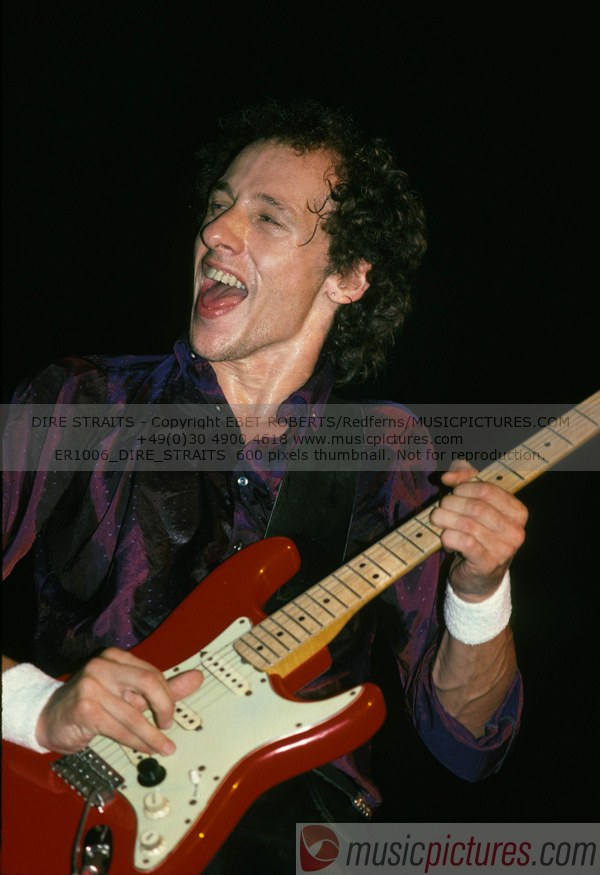
A voz e a guitarra do Dire Straits ao vivo em Cologne, 1979


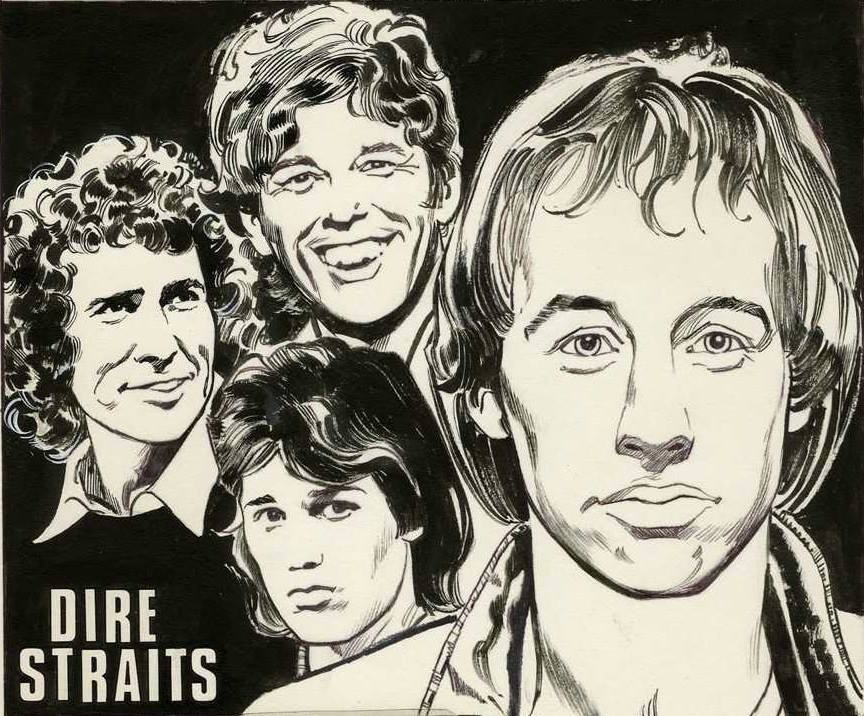
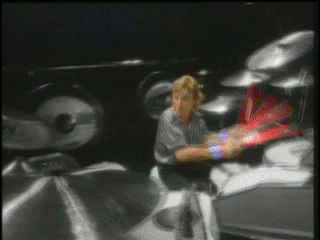 Um dos riffs de guitarra mais potentes de todos os tempos, sem dúvidas, o mais memorável da década de 80'.
Um dos riffs de guitarra mais potentes de todos os tempos, sem dúvidas, o mais memorável da década de 80'.



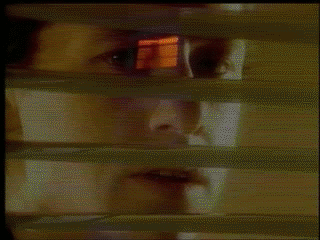 Blinds on the windows and a pain behind the eyes
(Cortinas nas janelas e uma dor atrás dos olhos)
Blinds on the windows and a pain behind the eyes
(Cortinas nas janelas e uma dor atrás dos olhos)





















